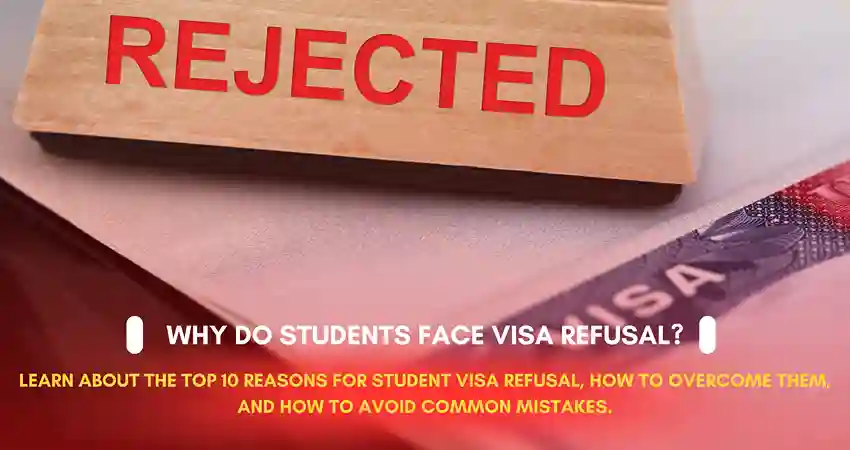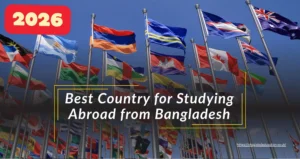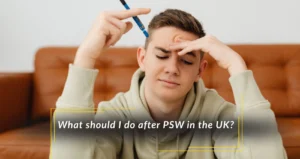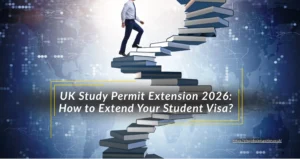For many students, especially those from South Asian and African backgrounds, being admitted to a university abroad feels like achieving the most challenging part of their dream. However, the real challenge often begins during the visa application process. A student visa is more than just a travel permit; it’s proof that you are a genuine student with sufficient funds, a clear plan for the future, and no intention of overstaying your visa.
Every year, thousands of applications are rejected because students overlook key requirements. The USA tops the list of countries that refuse student visas. A refusal doesn’t mean your dream is over, but understanding why it happened can help you prepare better next time.
Below, I outline the 10 most common reasons students face visa refusal, accompanied by practical examples.
Table of Contents
Toggle1. Inadequate Financial Resources
Immigration officers require proof that you can support yourself without relying on illegal work or government assistance. Many students from South Asia and Africa can’t afford tuition and leave university without graduating. As a result, immigration officers ensure adequate financial resources for education.
- Insufficient funds: If your bank statement doesn’t show enough money to cover tuition + 1 year of living costs, your visa may be denied.
- Unclear sources of money: Sudden large deposits in your account (without a salary slip, loan letter, or sponsor proof) make officers suspect fraud.
- Sponsor credibility: If a parent, relative, or third party is sponsoring you, the visa officer will check their income, tax records, and legal status. If these don’t look reliable, the visa can be refused.
- Country-specific rules: Germany requires a blocked account with about €11,208 (2026 update). If this account isn’t set up, your visa may be rejected.
2. Lack of Genuine Intent to Study
A student visa is not a shortcut to immigration. Officers need to see that you truly want to study and that you will return after graduating, rather than settling down permanently.
- Weak ties to your home country: If you can’t show reasons to return (like family, property, or a job offer), officers may think you’ll overstay.
- Course mismatch: Selecting an unrelated course of study can raise red flags. For example, a student with a bachelor’s degree in engineering is applying for a master’s degree in fashion without an explanation.
- Poor SOP/Personal Statement: If your essay is vague, copied, or doesn’t explain your plans, it signals weak motivation.
- Interview performance: During visa interviews, inconsistent or nervous answers (e.g., not knowing your course modules) can raise doubts.
3. Issues with Documentation
The immigration process relies heavily on paperwork, and even minor errors can jeopardise your case.
- Incomplete forms: Leaving blanks, spelling errors, or wrong dates.
- Fraudulent papers: Fake degrees, bank statements, or sponsorship letters can get you banned from future applications.
- Inconsistent details: If your financial documents say one thing and your SOP says another, credibility is lost.
- Expired documents: Old IELTS results or outdated bank statements are not accepted.
4. Academic & Language Barriers
Officers must ensure that you can handle the medium of study abroad. It relies heavily on different English language testing systems, such as IELTS, OIETC, MOI, and LanguageCert, and requires a specific score that showcases a student’s ability to study in English. Are you stressed about preparing for an English proficiency test? You can reach out to STS English Academy for help.
- Low grades: If your academic performance doesn’t meet the program’s entry requirements, your visa may be denied.
- Unrecognised institutions: A degree from a non-accredited college might not count.
- Low English proficiency: IELTS, TOEFL, or Duolingo scores below requirements show you might struggle in class.
5. Timing & Application Errors
Deadlines are a strict part of the immigration process. You must arrive at university before your classes begin.
- Late application: If you apply too close to your course start date, there may not be enough processing time.
- Missed steps: Forgetting to submit biometrics or pay the visa fee.
- Wrong visa type: Applying for a tourist visa instead of a student visa by mistake.
6. Previous Immigration History
Students with a history of violations are considered high risk. This includes overstaying visas in another country. Having multiple past visa refusals without improved documentation. Having an illegal work history on previous visas. Having a previous violation history in one’s own country.
7. Criminal & Security Concerns
- Criminal record: Even minor cases like theft or fraud may block your visa.
- National security risks: Countries do background checks to filter unsafe applicants.
8. Medical Inadmissibility
- Public health risk: Contagious diseases (like untreated TB) can lead to refusal.
- Missing health tests: The UK, Canada, and Australia often require medical checks before approval.
9. Institution & Program Issues
- Non-accredited universities: If your chosen school is not recognised, visas may be denied.
- Low-ranked private colleges: Some embassies track schools with high visa misuse.
- Short or irrelevant programs: Applying for a 6-month diploma after a Bachelor’s may look suspicious.
10. Suspicious Travel Patterns
- Multiple visa applications at once: Applying to Canada, the UK, and the USA at the same time looks doubtful.
- Frequent unexplained travel: Can make officers suspect misuse of visas.
Although visa refusal can be stressful, it is usually the result of fixable mistakes. Many students are approved after reapplying with stronger evidence. Remember, the visa officer’s job is not to reject you; it’s to ensure that only qualified, prepared students are approved.
To avoid costly mistakes, consult with experts like STS Global Education. They provide free guidance on course selection, finances, statement of purpose (SOP) writing, and visa interview preparation. STS has 13 branches in seven countries and has already helped over 50,000 students achieve their study abroad goals.
FAQs
How to Avoid Visa Refusal?
- Strong financial proof: Show stable and transparent sources of income.
- Choose a course that makes sense for your goals to demonstrate a clear academic and career path.
- Write a well-crafted statement of purpose (SOP) that shows why this course, country, and university matter to you.
- Demonstrate home ties by showing family, career, or property connections back home.
- Be confident in interviews. Learn your course details, and speak naturally.
- Submit complete documents. Double-check every page before submitting.
- Apply early, at least two to three months before classes begin.
- Choose reputable universities and avoid “visa factory” institutions.
Does a scholarship increase visa approval chances?
Yes. A scholarship boosts your financial credibility, demonstrating strong funding and reducing concerns about visa-related financial inadequacy. Showing such secured funding can significantly enhance your case.
If my student visa is rejected, when can I reapply?
You can reapply at any time because there is no waiting period. However, before you reapply, analyze why you were refused and make sure you address those issues.
How do I overcome a 214(b) visa refusal?
A 214(b) refusal means that the officer did not believe that you intend to be a non-immigrant. To overcome this, reassess and strengthen your application. Provide robust evidence of your ties to your home country, such as family, job, or property. Clarify your academic goals and ensure your documentation is consistent.
How do I overcome an F-1 visa refusal?
First, familiarise yourself with the reasons for denial (commonly cited under Section 214(b)). Then:
- Submit stronger financial documentation (e.g., scholarships, sponsor letters)
- Clarify your academic intent and career plans
- Rehearse your interview responses confidently
- Only reapply when your situation improves or new evidence is available
How to answer visa refusal questions in a reapplication interview?
Be honest and concise. Explain what has changed since the initial refusal and provide new evidence, such as improved finances or career plans. Address the reasons for the refusal directly without sounding defensive.
How to answer "Why should I approve your F-1 visa?
Highlight the alignment between your study plan and future career goals. Emphasise your financial stability, genuine intent to return home after studies, and how the program is key to your professional development.
Does entering the country’s diversity visa lottery affect student visa chances?
Yes, it may raise suspicion of immigrant intent because lottery applicants intend to stay. If asked, be sure to clarify your sincere academic goals and future plans back home.
Can my DS-160 form errors cause a rejection?
Absolutely. Incorrect or inconsistent information, such as mismatched DS-160 IDs, can cause confusion and delays. Always recheck everything before submitting.




